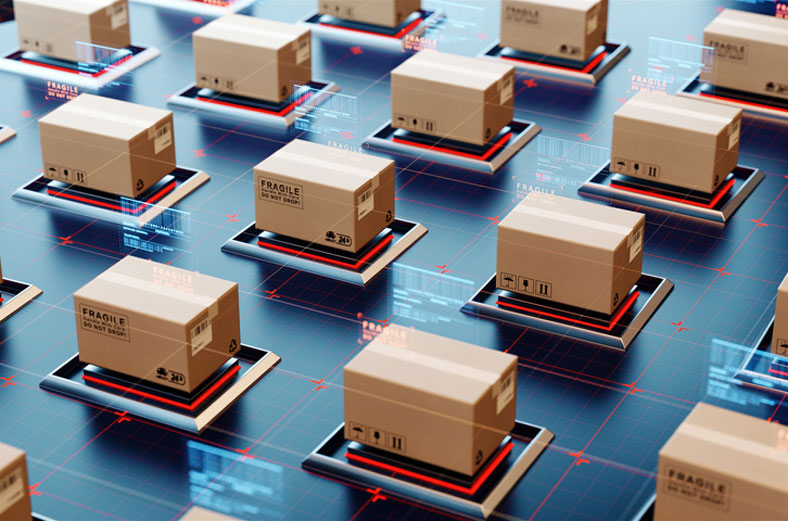Written by Scott Wilson

Technology is a field that has utterly transformed the logistics industry. RFID trackers, automated barcode scanners, Zoom standups with staff from around the world, massive ERP (Enterprise Resource Planning) systems to track it all… it’s hard to imagine how logistics would work today without technology in the supply chain.
All those whizz-bang high-tech tools have to come from somewhere, though.
The innovations tech companies have brought to their own supply chains have led to unparalleled advances in supply chain management.
In fact, the technology industry has pioneered some of the most complex, but efficient, supply chain transformations in the world today. And tech companies usually make a practice of using their own technological inventions first.
For supply chain professionals, that makes the tech industry an incredibly exciting and challenging place to work.
Take on a supply chain management role in any other industry and you’ll watch that technology slowly trickle out into the world. In the tech industry, that same job will give you a front-row seat to that innovation unfolding in real-time.
Creating iPhones and Other High-Tech Devices Requires Robust Supply Chains and Skilled SCM Pros

Technology product supply chains are complex.
In part, that’s because computers and devices today are astoundingly complex machines. You wouldn’t know it from where they begin: it’s true that most are built around a core made from the second most abundant element on earth: sand.
The most complex devices start with the simplest kinds of minerals, but creating a market-ready product takes extraordinarily complex supply chain and logistic operations.
But it’s not the kind of stuff you can scoop up on the beach. Pure semiconductor-grade silicon goes through multiple steps before it can be pressed into ingots and used to etch wafers for processors.
And it’s hardly the only component in these devices. A typical iPhone includes gold, silver, palladium, yttrium, and neodymium, rare metals that are often only found in exotic places. They are enormously difficult to mine and process.
The iPhone Supply Chain Stands Alone – It’s No Surprise that Apple CEO Tim Cook Has a Background in SCM
 Part of the Apple advantage comes from having a CEO who really gets the system: Tim Cook earned an MBA and specialized in operations and supply chain management during his early tenure at the company. At his urging, the company made speculative, risky investments in flash memory supply, holiday season freight reservations, and moved to just-in-time manufacturing. He cut supply chain vendors from more than 100 to only 24 and slashed warehouse space in half.
Part of the Apple advantage comes from having a CEO who really gets the system: Tim Cook earned an MBA and specialized in operations and supply chain management during his early tenure at the company. At his urging, the company made speculative, risky investments in flash memory supply, holiday season freight reservations, and moved to just-in-time manufacturing. He cut supply chain vendors from more than 100 to only 24 and slashed warehouse space in half.
Today the company turns over inventory every five days. Yet during the COVID-19 pandemic, it barely missed a beat.
The flagship device for the company is the iPhone. Despite Cook’s efforts to trim processes, the company still relies on components delivered from 43 different countries across 6 different continents to put together the typical iPhone. Accelerometers from Germany, touch screens from South Korea, chips from Taiwan, batteries from China, all assembled overseas and shipped to consumers around the world.
But the iPhone supply chain runs like clockwork. The company pumps out around 200 million phones per year. It remains both the largest and most profitable smartphone company in the world.
If it wasn’t for incredible supply chain management, technology companies would never get off the ground.
The assembly process for such devices is also tough to master. The intricacy and fine tolerances require special tooling. The economics that makes it all affordable often demands labor paid at lower international rates. That makes for a lot of intercontinental shipping and tracking. And all of it only happens because some of the sharpest supply chain managers in the business are putting together procurement, transport, and operations processes every single day.
Supply Chain Risk Management is a Special Consideration for Technology Companies
Yet those wonders of connectivity and digital transformation didn’t fare so well during the COVID-19 pandemic. The tightly bound logistics train for computer chips that power everything from vehicle navigation systems to laptops went off the rails right at the start. All the efficiencies that technology companies had engineered into their supply chains turned into vulnerabilities.
The technology industry supply chain has also taken on big geopolitical overtones. Tech is so vital to national interests that the government has stepped in to ensure ICT (information and communications technology) supply chains remain stable and secure. Government funds for reshoring critical tech manufacturing capabilities and guarding against tampering in key components are already flowing.
The struggles of the pandemic also ran the other direction: by 2022, computer manufacturer Acer was warning that the biggest danger was no longer a laptop shortage, but rather an oversupply of inventory threatening profit margins.
Clearly, for tech industry supply chain managers, it’s a fine line to walk… one requiring the best education they can get.
What Exactly is the Software Supply Chain?
 Whether it’s Dell revolutionizing build-to-order computer shopping or Apple popping out cutting-edge processors for their next groundbreaking phone, it’s not hard to wrap your head around what’s involved in bringing hardware components together to create high-tech products.
Whether it’s Dell revolutionizing build-to-order computer shopping or Apple popping out cutting-edge processors for their next groundbreaking phone, it’s not hard to wrap your head around what’s involved in bringing hardware components together to create high-tech products.
But hardware is only half the story. It’s all just a jumble of compressed sand without apps to run on it.
Modern software is built from other software. Programmers don’t start from scratch any more than carpenters start by felling trees. Instead, they assemble apps from components and libraries coded elsewhere, often using tools sold by third parties.
Someone has to line all that stuff up before they even get started.
Enter software supply chain management. Although shipping happens at the speed of light and storage is allocated by flipping magnetic fields on platters spinning at 15,000 RPM, software companies have similar category inputs as other tech businesses: procurement, contract management, production, and compliance.
In fact, software supply chain security and software supply chain risk management are some of the biggest components. A malicious bug or vulnerability in upstream tools can create catastrophe in the finished product.
The software supply chain’s output has similar needs: it must be tracked, packaged, and distributed in some way, shape, or form. It’s a unique, but vital part of the technology industry supply chain.
How a Modern SCM Education Will Prepare You to Manage Tech Industry Supply Chains

If you want to play in the tech industry, you have to bring your A game every day. Some of the smartest people on the planet are showing up before the sun rises at tech giants and startups. They are putting their all into changing the world. You need to be able to do the same.
There’s no room for supply chain and logistics professionals who can’t keep up. So, getting a first-rate SCM degree is an absolute must for supply chain jobs in this sector.
Those positions will require a bachelor’s degree at a minimum. A four-year program like a Bachelor of Science in Logistics and Supply Chain Management offers important background and hands-on training in supply chain concepts. But it also includes the kind of technical and general knowledge that tech companies expect new hires to have. Social and psychological study, history, and even arts build well-rounded candidates who can cope with any challenge thrown at them.
Graduate degrees are commonly required in supply chain and logistics technology industry jobs, too. Because technology supply chains tend to be global, degrees like a Master of Science in Global Supply Chain Management get a lot of traction in this industry.
There are also degrees specific to supply chain technology, like a Bachelor of Science in Supply Chain and Logistics Technology. These are not specific to the tech industry, but rather offer technical training relevant to any supply chain operation. Still, considering the cutting-edge approach that many tech companies take to their own logistics systems, these can be a good degree to earn for the tech industry.
In any case, loading up with as many STEM electives as possible is a good bet. You need to be able to talk the talk when working with hardware and software engineers.
High-Tech Innovations are Quickly Integrated into Supply Chain and Logistics Processes
 The technology industry is also coming out in front of many new groundbreaking trends in technology, like blockchain-based tracking.
The technology industry is also coming out in front of many new groundbreaking trends in technology, like blockchain-based tracking.
The trends go the other direction, too… technology companies are innovating in the logistics space. Amazon, of course, practically invented the now ubiquitous e-commerce logistics system. They’re an example of a technology company that has also become a 3PL (Third Party Logistics) provider along the way.
And, of course, artificial intelligence and machine learning (ML) are set to revolutionize almost every field. The supply chain for companies building those tools relies heavily on processors and servers to crunch the massive piles of data that ML models require.
Careers in Technology Supply Chain and Logistics Operations

With all the same kinds of gritty transportation and storage needs as well as high-flying business intelligence and analytics demands as any modern industry, supply chain jobs in technology are similar to the roles you will find in any major corporation.
Because the tech industry tends to lean more heavily on international manufacture and rare materials sourcing, these positions do tend to require more international supply chain management expertise.
Technology also moves fast. The supply chain has to keep up with product lines that can change almost overnight. So, inventory managers and operations managers are always in demand to manage products and processes that have to turn over on a dime.
By the same token, product delays can absolutely kill competitive advantage. Senior supply chain managers play a big role in technology companies to tie together all the pieces of production, product development, delivery, and marketing to land with a splash.
In an industry that reinvents itself practically overnight, you don’t have to
Specialized Knowledge of Tech Industry Supply Chains Can Come with Big Paychecks

If there’s one thing the technology industry is known for worldwide, it’s high salaries. People go to high tech to make their fortunes. And that’s certainly possible for supply chain managers in the field, according to the Bureau of Labor Statistics (BLS).
In fact, the Computer and Peripheral Equipment Manufacturing field is one of the top five highest-paying industries for logisticians, with a median salary level of $112,170. And it is THE top-paying industry for Transportation, Storage, and Distribution managers, who make an average of nearly $190,000 annually. Those working in Semiconductor and Other Electronic Component Manufacturing are in the same ballpark, averaging $156,640 per year.
Technology industry supply chain jobs pay well, even before you factor in common tech industry benefits like stock options and incentive bonuses.
Pulling out a bit, the entire sector of Computer and Electronic Product Manufacturing, which covers most technology companies, including those above, still has solid salary offers in SCM.
For logisticians, who fill out the rank and file of analyst, operations, and procurement positions, the average annual pay was $95,550 across the sector in 2022.
For more senior managers, those in the Transportation, Storage, and Distribution Manager category, the 2022 average was $158,670.
Both kinds of positions are open to graduates with supply chain management degrees. Naturally, more senior roles will tend to go to staff with more advanced degrees. But either way, you can tap into the big money that the tech industry generates every year. And you can be part of the next wave of both supply chain technology and the society of the future.
2022 US Bureau of Labor Statistics salary and employment figures for Computer and Peripheral Equipment Manufacturing, Semiconductor and Other Electronic Component Manufacturing, and Computer and Electronic Product Manufacturing reflect national data, not school-specific information. Conditions in your area may vary. Data accessed September 2023.


